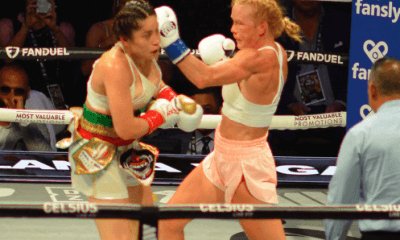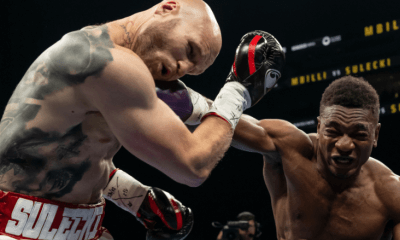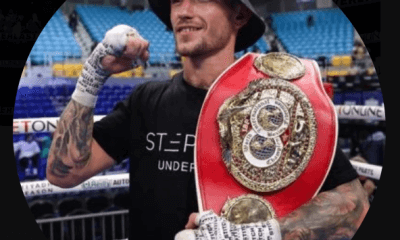Asia & Oceania
Roman “Chocolatito” Gonzalez Steps Up To Face Carlos Cuadras
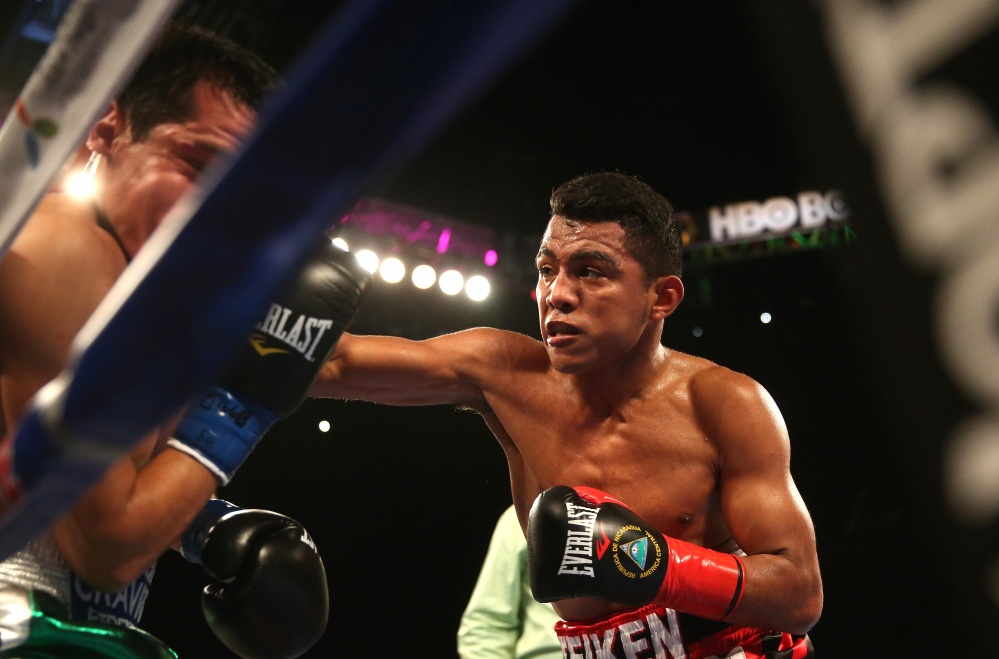
Gonzalez Steps Up – Inevitably, most eyes will turn to London next Saturday for Gennady Golovkin’s ritual slaughter of Kell Brook. Golovkin is a superstar and has earned that status, and Brook, too, is a fine fighter; but he is also a welterweight. That Brook is stepping straight up to middleweight to take on a monster like Golovkin is something to be admired, but Brook is the lesser man. A lesser man stepping up to take on a great fighter in his own division makes for a mismatch, and a mismatch is what we will see.
Over five-thousand miles away in Inglewood, California, a much more interesting fight will unfold by virtue of the fact that the equation is reversed. Roman Gonzalez, the pound-for-pound best in the world and lineal flyweight champion, is leaving 112lbs behind in favor of the super-flyweight division. In a weight-range where just three pounds matter, it’s a move almost as gutsy as the one Brook is pulling in London and certainly is much more likely to result in a satisfactory combat.
That said, it was not entirely unexpected. In fact, I predicted it more than six years ago when Gonzalez was just a minimumweight, writing that he might one day “drag his 5’3” frame as high as super-flyweight” in pursuit of pound-for-pound glory. So it has come to be. His opponent next Saturday will be the world’s #2 super-fly, Carlos Cuadras.
Cuadras is a serious man but he is one that has obtained his ranking in the modern manner, to whit, without bothering to meet ranked opposition. The division is not a strong one and in seeking fighters who lie outside the top ten, Cuadras has certainly failed miserably to extend himself; but he did take on a ranked flyweight, and one who has since established a ranking at 115lbs, in the form of Luis Concepcion. Concepcion had been beaten just twice, in 2011, on both occasions by the same man, Hernan “Tyson” Marquez. A brilliant exponent of intelligent pressure-fighting, Marquez won their first wonderful confrontation by eleventh round stoppage but brutally dispatched Concepcion in just one in the rematch. Concepcion re-gathered himself for a fine 9-0 run before meeting Cuadras in April last year for a vacant strap at the super-flyweight limit in Cuadaras’s home country of Mexico.
Cuadras boxed a disciplined fight. He remained on the move and relied heavily upon his jab, which is excellent. More, Cuadras is willing to double and triple it up while stepping. Cuadras’s fight plan against Concepcion is important in understanding his probable fight plan against Gonzalez because Concepcion, like Gonzalez, was the smaller man moving up and like Gonzalez, he brought pressure. Cuadras decided to give ground and bring Concepcion onto his punches. In no sense did he go and try to dominate the smaller man and Concepcion is shorter than Gonzalez.
Picking out a cohesive fight plan against Gonzalez is nightmarish. If you bring the fight to him you have to contest with his fluidity on offense which, now that Manny Pacquiao has waned, is the best in the world. He can be seen on film throwing combinations of seven and eight punches against fighters trying to pick their opportunities for a counter-punch and he goes up-and-down, left-and-right with the type of surety only seen in great fighters. But his best performances have all come against fighters who give ground – fighters like Cuadras.
In part, this is a question of styles. A cultured counter-puncher, Gonzalez is at his best when he is allowed to charge, pick his angles against a retreating opponent, find the chinks in their armour as they move away, just below the right elbow, just above a loose guard. Gonzalez did very well against Brian Viloria last October for the length of time that Viloria could stand the white-hot temperature in the pocket, but he became genuinely menacing when Viloria finally broke ground and ran. Gonzalez doesn’t just steam in. His footwork, though not balletic, is artistic. When he closes, he does so with a step left or to the right as often as he comes ahead, fostering confusion and, frankly, panic, even in world-class opponents. In retreating, these are the opportunities with which Cuadras will provide the diminutive Nicaraguan and his whole fight will become keeping Gonzalez off him.
Does he have the tools to achieve this?
Given that he is going to struggle to make size a factor on offense, and given that Concepcion was repeatedly able to press him into exchanges, it seems unlikely, but I am intrigued by how Gonzalez will cope with his snapping triple jab. The elephant in the room is Juan Francisco Estrada.
Estrada met Chocolatito in 2012 and provided him with his stiffest test to date. He is the same height and has the same reach as Cuadras and he, too, had an excellent jab. He also tested Gonzalez with mobility, fighting in the same counter-foraging style Cuadras excels at, though his circle was tighter. Of course, Estrada brings an overall skillset that is pound-for-pound in its own right and Cuadras does not. He might have Estrada’s lightness of foot and he might, like Estrada, marry this to an appetite for violence, but he also has some very serious deficiencies that cannot be found in Estrada. Most of all, he is given to coming square.
He does it when he side-steps on the outside, he does it when he gets ready to welcome an opponent for exchanges after bringing him onto a retreat and he even does it on the inside when he is firing. Gonzalez loves square opponents; he is like an axeman wielding against a hung steer. What he did to flyweight champion Akira Yaegashi when he abandoned his schooling bordered on the terrifying. Teak tough with a heart of molten iron beating in his chest, Yaegashi was broken in nine harrowing rounds.
Cuadras has the footwork and the smarts to avoid such a grisly fate, perhaps, but it makes establishing his own offense extremely difficult. Gonzalez, meanwhile, has an iron-tight guard and punch resistance so good that he has barely been hurt in nearly ten years boxing among various divisional top tens. Meanwhile, Cuadras will be suffering the terrible pressure of the most organized technical stalk in boxing, even allowing for the incredible work Golovkin will be doing a continent away a few hours before Gonzalez hears the bell.
In short, I favor Gonzalez heavily. The Mexican’s chances are basically twofold. First, he must suffer the rolling break of Gonzalez’s punches on his beach-head without suffering the usual affects. This could come from the innate toughness of his fistic kind, a variation of the inability of generations of punchers to hurt the hardest Mexican fighters, or it could come from the gifts of the weight. Gonzalez will be boxing ten pounds north of the division he turned professional at, nearly 10% of his original bodyweight, more than the 8.8% Brook will be suffering on the other side of the Atlantic. As fighters move up in weight they become less and less effective as punchers due to no less inarguable a law than the law of physics. A week out, Gonzalez weighed in at 117.9lbs, Cuadras 120.2lbs. This isn’t a huge difference, but Cuadras will rehydrate and come in significantly heavier on the night. If he can hold the Gonzalez punch without his fight-plan, ribs, or face crumbling and if he can establish that busy jab, we might be in for an interesting night.
I suspect, though, that it is more likely that Gonzalez will find Cuadras early and run him off his patch. Depending upon when, exactly, Cuadras pulls the trigger on his fighting retreat, and upon exactly how much he can take, we might see him stopped or we might see him drop one on the cards. I’ll go with the stoppage. If this happens, Roman “Chocolatito” Gonzalez will have proven himself the best fighter at two weights and among the very best in two more. Do not expect to see him go rocketing to the top of the super-flyweight rankings though. One Naoya Inoue sits proud atop that particular pile.
Inoue-Gonzalez is easily the best fight that can be made in boxing right now; I say that as someone who is very excited to see Kovalev box Ward. It’s a legitimate super-fight, a clash of cultures, styles, and pound-for-pound credentials. It is box-office in Japan. Whether or not it can be made remains to be seen. In Cuadras, Gonzalez is taking on the second best fighter in the world the division above his best. It won’t be an easy night’s work for him.
Probably.
Gonzalez Steps Up / Check out more boxing news and videos at The Boxing Channel,
-
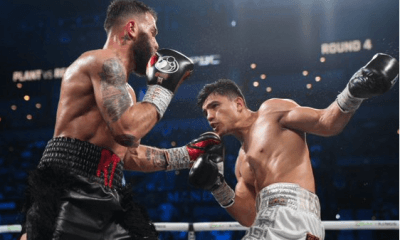
 Featured Articles4 weeks ago
Featured Articles4 weeks agoA Night of Mismatches Turns Topsy-Turvy at Mandalay Bay; Resendiz Shocks Plant
-

 Featured Articles2 weeks ago
Featured Articles2 weeks agoAvila Perspective, Chap. 330: Matchroom in New York plus the Latest on Canelo-Crawford
-

 Featured Articles1 week ago
Featured Articles1 week agoVito Mielnicki Jr Whitewashes Kamil Gardzielik Before the Home Folks in Newark
-
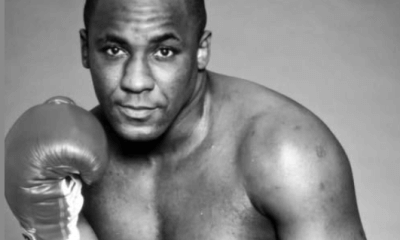
 Featured Articles4 weeks ago
Featured Articles4 weeks agoRemembering the Under-Appreciated “Body Snatcher” Mike McCallum, a Consummate Pro
-

 Featured Articles4 weeks ago
Featured Articles4 weeks agoAvila Perspective, Chap 329: Pacquiao is Back, Fabio in England and More
-

 Featured Articles3 weeks ago
Featured Articles3 weeks agoOpetaia and Nakatani Crush Overmatched Foes, Capping Off a Wild Boxing Weekend
-

 Featured Articles3 weeks ago
Featured Articles3 weeks agoFabio Wardley Comes from Behind to KO Justis Huni
-

 Featured Articles2 weeks ago
Featured Articles2 weeks agoCatching Up with Clay Moyle Who Talks About His Massive Collection of Boxing Books



